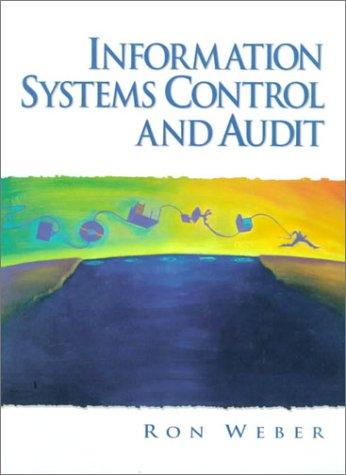Dayton Deliveries (DD) Plc. is a large Manchester-based distribution company with an extensive and diverse customer base
Question:
Dayton Deliveries (DD) Plc. is a large Manchester-based distribution company with an extensive and diverse customer base scattered throughout England. DD is regarded as a market leader in the distribution industry. Senior management have stated publicly that DD maintains its competitive edge in an aggressive marketplace through innovative use of information technology.
For several years, DD has had a QA function in its information systems department. As an information systems auditor working for the firm that conducts the external audit of DD, you have had responsibility for evaluating the reliability of controls in the QA function. Overall, you have been satisfied with the ways in which \(\mathrm{QA}\) personnel have discharged their duties. Indeed, at the conclusion of all control reviews of the QA function you have conducted, you have recommended to your partner that reliance be placed upon controls and that substantive testing be reduced as a result.
One day you are called to an urgent meeting with your partner. He is somewhat agitated because he has received a telephone call from the chief executive officer (CEO) of DD. The CEO is upset about difficulties that DD is experiencing with a major new warehousing system that it has implemented recently. The CEO has been besieged by complaints from irate users of the system. Apparently information that is being produced by the system contains significant errors. Moreover, reports produced by the system do not contain some important information that users need to make decisions about where to locate inventory within warehouses. DD's CEO has asked why these problems were not identified in the most recent audit. Your partner, in turn, has asked you about the basis you have used to recommend that reliance be placed on QA controls, which led to his deciding to reduce the extent of substantive testing during the remainder of the audit.
In light of the problems that have arisen, you visit DD and review the QA file on the warehousing system. You are surprised to find that there is little evidence of problems that have been encountered during development and testing of the system. In particular, you note that the relevant users, project team members, and QA personnel have signed off at various milestones during system development. When you interview the project team leader about this fact, however, she dismisses the sign-off documents. She tells you that senior management had demanded the new warehousing system be implemented as part of their overall strategic plan for DD. Moreover, they had imposed a deadline for the system that was almost impossible to achieve. Because of the significant way that their jobs would be affected, users had been against the system from the outset. When the project team and QA team first reported to senior management that there were major problems with the system, they were told to "stop finding obstacles and get on with the system." As a result, compliance monitoring by users, project-team members, and QA personnel had become a meaningless activity. Sign-offs at various milestones were a token affair. She comments that the current complaints by users are their "last-ditch efforts to get their own back on senior management before the job changes and job losses occur."
Required. What recommendations would you make to your partner in terms of
(a) the response he should provide to the DD's CEO, and
(b) any audit work that should now be undertaken? In terms of your own approach to the audit, are there any lessons to be learned?
Step by Step Answer:






